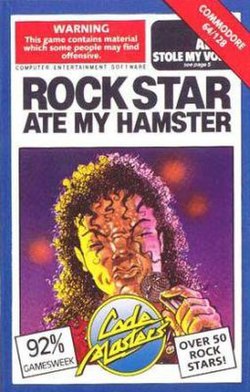Rock Star Ate My Hamster
| Rock Star Ate My Hamster | |
|---|---|
 |
|
| Developer(s) | Colin Jones |
| Publisher(s) | Codemasters |
| Designer(s) | Chris Graham |
| Platform(s) | ZX Spectrum, Commodore 64, Amstrad CPC, Amiga, Atari ST |
| Release |
|
| Genre(s) | Strategy, Music management |
| Mode(s) | Single-player |
Rockstar Ate My Hamster is a management strategy computer game developed by Codemasters in 1988 and originally released on their full-price Gold label for the Amstrad CPC, ZX Spectrum, Commodore 64, Amiga and Atari ST. The game was written by Colin Jones, later to become known as author/publisher Colin Bradshaw-Jones.
The name of the game was inspired by a 1986 Sun headline - 'Freddie Starr ate my hamster' - which served as a focal point for mid-1980s tabloid culture and helped further the career of the comic in question.
Desperate to get out of the circus theatrics business, Cecil Pitt and his sidekick, Clive, turn to the world of Rock music Management with the help of a £50,000 inheritance.
To win the game, one must select a band, record an album and earn 4 gold discs within the space of a year. If the player fails to meet this target, go bankrupt or have no musicians left, the game is over.
The game is almost entirely menu driven with options that allow the player to decide what the band does next.
The player's first task as manager is to pick musicians for the band (see below), and then whether they should buy them brand new equipment, second hand equipment or get some dodgy gear off the back of a lorry.
Once in the main game, the options presented are as follows:
Along the way, the player also has to decide:
Releasing an album or single makes them eligible for the charts. A Top 10 Singles & Albums charts (depending on what you have released) gets displayed on screen every Sunday. The other bands in the Top 10 are also parodies of other rock bands.
At the outset, the player can choose to hire up to four musicians to make up the band. The musicians are parodies of contemporary pop music stars. Their weekly wage depends on their abilities and their fame, ranging from £30,000 for "Bill Collins" down to just £50 for "Sidney Sparkle".
The game is heavy on parody on existing people and names, which wasn't well received across the board: according to Jones, "an irate parent had taken objection to one of the jokes in the spoof newspaper included in the box and W H Smiths pulled the game from their shelves".
...
Wikipedia
